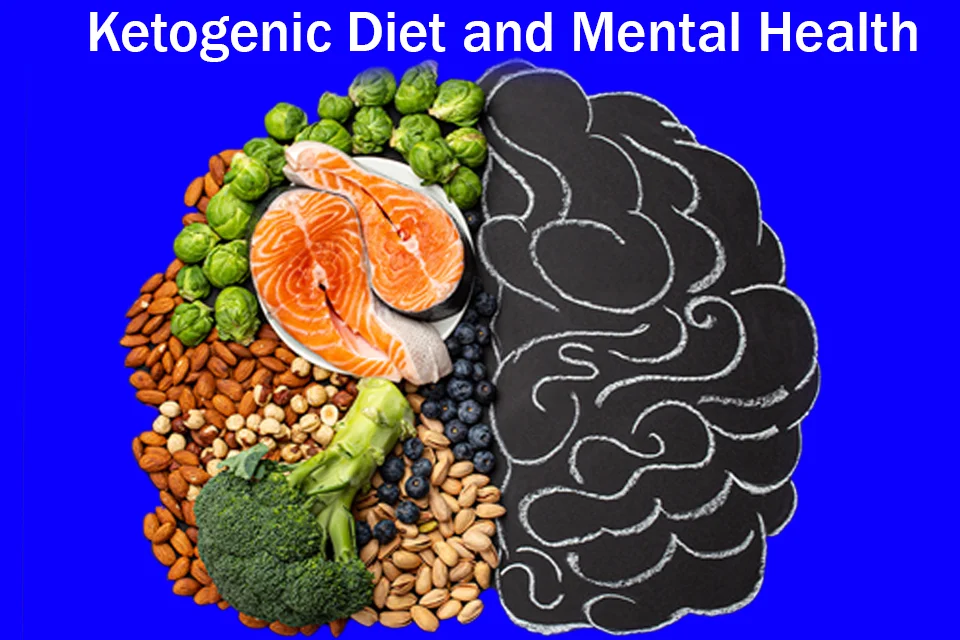The Link Between Ketogenic Diet and Mental Health
The relationship between Ketogenic Diet and Mental Health has gained significant attention in recent years, as researchers increasingly recognize the profound impact that nutrition can have on psychological well-being. In order to function properly, the brain requires a balanced intake of nutrients. Insufficient nutrition can lead to cognitive impairment and mood disorders, while a well-structured diet can enhance brain function and psychological resilience.
Research has shown that specific nutrients, like vitamins, omega-3 fatty acids, and minerals, play important roles in brain health and function. For instance, omega-3 fatty acids, often found in fatty fish, are crucial for building neuronal membranes and are linked to reduced symptoms of depression and anxiety. Meanwhile, deficiencies in vitamins B, D, and minerals such as magnesium can negatively affect mood regulation and cognitive performance. This shows how important nutrient-rich diet is for maintaining mental well-being.
Research into the Ketogenic Diet and Mental Health has been growing, revealing notable connections between ketones and brain function. Ketones serve not only as energy sources but also have neuroprotective properties, potentially leading to improvements in mood, anxiety, and cognitive performance. Understanding the foundations of the ketogenic diet is crucial for those seeking to explore its potential mental health benefits.
Table of Contents
To understand how Ketogenic Diet and Mental Health are linked together, it is essential to first understand the basic of Ketogenic Diet. I already have a detailed blog post on Ultimate Beginner’s Guide to Ketogenic Diet that you can read for detailed insight. But here we can just recall a bit to get the basic idea.

What is Ketogenic Diet?
The ketogenic diet, often referred to as the keto diet, is a high-fat, low-carbohydrate dietary plan that aims to promote the state of ketosis in the body. It helps body to produce ketones, a competitive energy source to the carbohydrates. Ketones are produced in the liver through a process that is known as Ketogenesis. Ketones are used primarily as energy source by brain, heart and skeletal muscles.
Ketogenic diets thus have a linkage to brain as ketones are used in brain as an energy source in absence of glucose or carbohydrates. As we all know that ketogenic diets constitute of foods that have fat contents and are void of carbohydrates, these foods trigger a process in which body is coded to get its energy reliance on ketones instead of carbohydrates. When the body enters ketosis, it shifts from using glucose as its primary source of energy to utilizing ketones, which are produced from fat. This shift can ultimately influence various aspects of health, including mental health.
In general, a typical keto diet consists of approximately 70-75% fat, 20-25% protein, and only about 5-10% carbohydrates. This macronutrient composition is essential for inducing ketosis, as it limits carbohydrate intake drastically, leading to reduced insulin levels and enabling the body to tap into fat reserves for energy.
Ketogenic Diet And Mental Health:
Emerging studies suggest that the Keto Diet and Mental Health share a significant connection, primarily through the stabilization of blood sugar levels and the promotion of ketone bodies as an alternative energy source for the brain. These ketones have been associated with neuroprotective effects, which may contribute to enhanced cognitive function and mood stabilization.
Additionally, the anti-inflammatory effects of a ketogenic diet could further explain its potential benefits for mental health. Chronic inflammation has been linked to various mental health disorders, and the adoption of a ketogenic diet may help mitigate these inflammation-related effects, offering another layer of protection for mental wellness.
Overall, investigating the connection between Ketogenic Diet and Mental Health reveals how critical proper nutrition is for emotional and cognitive well-being. The unique properties of a ketogenic diet suggest promising avenues for improving mental health outcomes, warranting further exploration.
Research on Ketogenic Diet and Mental Health: An Overview
The ketogenic diet has garnered considerable interest not only for its effects on weight loss but also for its potential impacts on mental health. Numerous studies have explored the relationship between a Ketogenic Diet and Mental Health, revealing promising findings that indicate notable benefits. Research suggests that adopting a ketogenic diet may lead to improvements in mood, a reduction in anxiety and stress levels, and various cognitive enhancements.
One pivotal study published in the “Journal of Neuropsychiatry” highlighted that participants on a ketogenic diet reported significant improvements in mood stability and reduction in symptoms associated with anxiety disorders. The low carbohydrate content in the ketogenic diet is theorized to influence neurotransmitter regulation, specifically increasing levels of gamma-aminobutyric acid (GABA), a neurotransmitter linked to reduced anxiety. This biochemical mechanism illustrates how the Ketogenic Diet and Mental Health are linked can foster a calmer mental state.
Additionally, a review in “Frontiers in Nutrition” examined several trials and found evidence supporting cognitive benefits associated with the ketogenic diet. Participants on a ketogenic diet demonstrated improved memory and overall cognitive performance compared to those on a high-carbohydrate diet. The increased production of ketone bodies, which serve as an alternative energy source for the brain, is believed to enhance neuronal resilience and promote clearer thinking.
In conclusion, the existing body of research supports the notion that a ketogenic diet can have beneficial effects on mental health. By enhancing mood, reducing anxiety, and improving cognitive function, the keto diet presents a viable nutritional strategy for those seeking to improve their mental well-being.
Keto’s Role in Reducing Stress and Anxiety
The ketogenic diet, commonly referred to as the keto diet, has its impact not only on physical health but also has significant effects on mental health.
- One of the prominent benefits associated with the ketogenic diet is its ability to help reduce stress and anxiety levels. This reduction can be attributed to several mechanisms, primarily involving ketones, neurotransmitter balance, and stable blood sugar levels.
- Ketones have been found to exhibit neuroprotective properties, potentially influencing brain health positively and aiding in the reduction of anxiety. By providing an efficient energy source, the ketogenic diet may prevent energy dips that can exacerbate feelings of stress.
- Another crucial aspect of the keto diet is its effect on neurotransmitters, particularly gamma-aminobutyric acid (GABA). GABA is a key inhibitory neurotransmitter that helps to regulate anxiety levels.
- Moreover, the ketogenic diet stabilizes blood sugar levels, preventing the erratic fluctuations that can lead to mood swings. Consistent energy levels throughout the day not only improve focus but also alleviate stress. By minimizing these sudden peaks and troughs in blood sugar, individuals may experience a more stable emotional state.
Therefore, the intersection of the Ketogenic Diet and Mental Health presents a promising avenue for managing stress and anxiety, reflecting how dietary choices can profoundly impact psychological well-being.

Cognitive Benefits of the Ketogenic Diet
The ketogenic diet has notable impacts on mental health, particularly cognitive functioning. Ketones have been proven in multiple studies to have positive impact in overcoming mental health issues. Key reasons behind these positive effects in brain’s positive response to ketone as an energy source is that fact that brain prefers ketones as an energy source.
Ketogenic diets have been proven to evade glucose hypometabolism, overcome neurotransmitter imbalance & lessen oxidative stress and inflammation. Here, I would like to give short description of these mental illnesses and how ketogenic diets help overcome them.
Neurodegenerative disorders resulting from glucose hypometabolism
Glucose hypo-metabolism is condition in which brain underutilizes glucose which is the primary source of energy for its functioning thereby causing defective neural processes. This condition may lead to a neurodegenerative disorder in which brain and spinal cord cells start to decay irreversibly. Alzheimer’s, Parkinson’s and Huntington’s diseases are neurodegenerative disorders.
Impact of Ketogenic Diet in evading and curing glucose hypometabolism
In condition such as glucose hypometabolism where brain’s ability to utilize glucose for its energy needs is significantly reduced, ketogenic diets help to fulfil brain’s energy needs through an alternative energy source that is ketone. In this way, this disorder has been proven to be greatly downsized. Brain starts to improve its neural processes thus enhancing otherwise reduced cognitive functioning.
Neurotransmitter Imbalance
Neurotransmitter imbalance is a condition where right levels of key neurotransmitters (chemicals that help in transmitting messages from neurons to target cells) get imbalanced. Right and balanced amounts of key neurotransmitters such as serotonin (which helps in mood regulation, digestive functions, sleep cycles and sexual processes), dopamine (which is related to bodies pleasure and reward system and is also known as feel-good neurotransmitter) and acetylcholine (which regulates cognitive functions, involuntary functions and act as neuromuscular transmitter) are essential for human body to function in correct manner.
Impact of Ketogenic Diet in balancing levels of neurotransmitters
Ketone has been related to serotonin production thus helping in overcoming depression. By having ketogenic diet, increased production of dopamine may be achieved through increased levels of tyrosine which is a precursor to dopamine production thus relieving anxiety achieve feel-good state of mind. Through a regular ketogenic diet, balanced levels of acetylcholine production can also be achieved, thus improving cognitive functioning of brain.
Oxidative Stress and Inflammation
The condition of Oxidative stress is the one in which body starts to produce extra reactive oxygen species (ROS) and there is an imbalance between body’s ROS production and the reactive detoxifying substance to counter it. Our body produces oxidants also called free radicals during the process of metabolism. These free radicals are harmful to the body and our bodies have inherent defense mechanism in the shape of anti-oxidants to counter them, hence keeping a balance.
If body produces more free radical or its ability to counter the free radicals decreases, there may occur an imbalance called oxidative stress. There is a strong link between inflammatory disorders and stress, particularly post-traumatic stress disorder. There is a complex interplay between oxidative stress and inflammation, through which oxidative stress causes inflammation and vice versa.
Impact of Ketogenic Diet to overcome Oxidative Stress and Inflammation
Ketogenic diet has been associated with production of enzyme that are helpful in neutralizing ROS. Antioxidant enzymes such as superoxide dismutase (SOD) and glutathione peroxidase help in countering ROS thus keeping avoiding oxidative stress. Moreover, ketogenic diet may prevent inflammatory pathways like the NLRP3 inflammasome, thus reducing levels of TNF-α and IL-6 which are pro-inflammatory cytokines.
Ketogenic Diet circumvents glucose hypo metabolism, rebalances neurotransmitter imbalance & reduces oxidative stress and inflammation. So, in medical theory, ketogenic diet should be able to treat mental illnesses. Ketogenic diet is used to treat pediatric epilepsy for well over 100 years. Recent studies are suggesting towards aiding role of ketogenic diet in treating schizophrenia, autism spectrum disorder, binge eating disorder, anxiety and major stress disorder. It has been proven to be helpful in treating obesity in addition to relieving diabetes and heart related diseases.
Moreover, the ketogenic diet encourages the consumption of healthy fats, which are crucial for maintaining neuronal health. Fats like omega-3 fatty acids, found in fatty fish and certain nuts, are essential for brain function and have been linked to improved memory and cognitive speed. As such, integrating these healthy fats into a ketogenic framework can optimize cognitive capacity while providing the energy required for robust mental activity.
Furthermore, anecdotal evidence from individuals following the ketogenic diet often reports improvements in mood, anxiety reduction, and better concentration. As this diet encourages steady energy levels throughout the day, many practitioners experience fewer energy spikes and crashes, leading to enhanced productivity and mental well-being. Overall, the growing body of research underscores the cognitive benefits associated with a ketogenic diet, reaffirming its role as a promising tool for enhancing mental health.

Potential Challenges and Considerations
Embarking on a ketogenic diet can offer numerous benefits, particularly concerning mental health; however, it is crucial to recognize the potential challenges that may accompany such a dietary transition. For individuals with pre-existing mental health conditions, the shifts associated with adopting a ketogenic diet may produce both physical and psychological effects that warrant careful consideration.
- The initial stages of the diet can result in what is commonly referred to as the “keto flu,” featuring symptoms such as fatigue, irritability, and cognitive fog. These symptoms can exacerbate existing mental health issues, making it vital for individuals to approach this dietary change with caution.
- One significant concern is the need for a tailored approach to the ketogenic diet. Not every individual will respond positively to this dietary strategy, particularly those with previous psychiatric disorders, such as anxiety or depression.
- Moreover, the drastic reduction in carbohydrates may impact serotonin levels, which can further influence mood and emotional regulation. Therefore, it is essential for individuals to consult with healthcare professionals before making substantial dietary changes.
- Lastly, as with any diet, long-term adherence to a ketogenic lifestyle may present its difficulties. Social situations, cravings for carbohydrates, and the potential for nutritional deficiencies can challenge one’s commitment to the diet. It is paramount to establish a support system and be aware of personal limits to foster both physical and mental well-being throughout this journey.
Overall, while the keto diet can positively influence mental health, understanding and addressing these potential challenges through professional guidance and personal awareness is critical for sustainable success.
Integrating Keto into a Holistic Mental Health Strategy
Integrating a ketogenic diet into a holistic mental health strategy involves more than simply changing one’s eating habits; it necessitates a comprehensive approach that encompasses various lifestyle practices. The keto diet focuses on high-fat, low-carbohydrate consumption, leading to ketosis, a metabolic state known to support cognitive function. However, optimizing mental health often requires additional supportive practices. Acknowledging this, individuals can enhance the benefits of a ketogenic diet by incorporating regular physical activity, mindfulness practices, and therapeutic interventions.
Regular Exercise:
Engaging in regular exercise is a vital component of any mental health strategy. Physical activity stimulates the production of endorphins and serotonin—neurotransmitters that play critical roles in mood regulation. Combining exercise with a ketogenic diet can boost energy levels and mental clarity, providing a dual benefit that enhances overall well-being. Whether it’s through aerobic activities, strength training, or yoga, consistent movement supports both physical health and mental resilience.
Mindfulness:
Another essential aspect is the practice of mindfulness, which can help individuals manage stress and anxiety. Incorporating mindfulness techniques such as meditation, deep breathing, or journaling into a daily routine complements the effects of the keto diet on mental health. These practices encourage individuals to cultivate greater awareness of their thoughts and feelings, often leading to improved emotional regulation and coping strategies.
Therapy:
Lastly, working with mental health professionals can provide personalized support. Therapy can help individuals explore underlying issues contributing to mental distress, while also equipping them with tools to navigate challenges. A holistic approach that integrates a ketogenic diet with therapy enables a deeper understanding of personal mental health and equips individuals to make lasting changes.
The synergy between these elements underscores the importance of viewing mental health through a multi-faceted lens, ultimately leading to a more fulfilled life.
Embracing Keto for Mental Wellbeing
In exploring the relationship between the Ketogenic Diet and Mental Health, it is crucial to recognize the potential benefits that this dietary approach can offer. Several studies suggest that adopting a keto diet may lead to improvements in mood and cognitive function.
The keto diet shifts the body’s metabolic state into ketosis, wherein it predominantly burns fat for fuel instead of carbohydrates. This metabolic adaptation has been associated with increased production of ketone bodies, which are believed to provide neuroprotective benefits. Additionally, the anti-inflammatory properties often attributed to the ketogenic diet might also play a role in alleviating symptoms associated with various mental health conditions.
While the potential benefits of keto and its impacts on mental health are numerous, it is essential to adopt a holistic approach to mental wellness. Incorporating other elements such as regular physical activity, adequate sleep, and stress management techniques can significantly amplify the positive effects of a ketogenic diet. Individuals interested in exploring this dietary option should consult with healthcare professionals to ensure a balanced and sustainable approach tailored to their unique needs.
FAQ’s:
Can the ketogenic diet improve conditions like anxiety and depression?
Yes, many researchers have indicated that individuals with anxiety and depression may experience relief by adopting this approach. The diet’s emphasis on healthy fats, such as omega-3 and omega-6 fatty acids, supports brain health and cognitive function, potentially leading to improved mood and emotional stability.
How does the this diet affect mental health?
Numerous studies suggest a significant link between the ketogenic diet and mental health improvement. By stabilizing blood glucose levels, the keto diet may help to reduce anxiety and depression symptoms. The diet’s impact on neurotransmitters and energy production in the brain is believed to contribute positively to mental well-being.
What is the ketogenic diet?
Often referred to as keto, is a high-fat, low-carbohydrate eating plan that aims to shift the body into a state of ketosis. This metabolic state encourages the body to utilize fat as its primary energy source instead of carbohydrates.
Are there any risks associated with the this diet related to mental health?
While the ketogenic diet offers various mental health benefits, there can be risks if not followed properly. It’s essential to ensure balanced nutrition and avoid nutrient deficiencies, which could have adverse effects on overall mental health. Consulting with a healthcare professional before beginning the keto diet is advisable.

